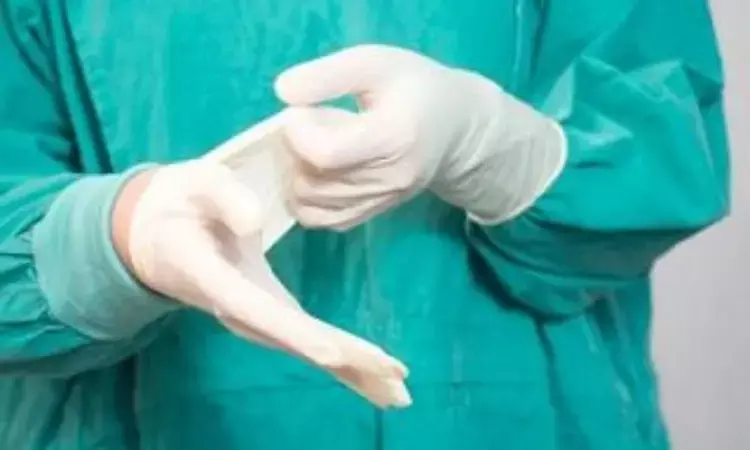- Home
- Medical news & Guidelines
- Anesthesiology
- Cardiology and CTVS
- Critical Care
- Dentistry
- Dermatology
- Diabetes and Endocrinology
- ENT
- Gastroenterology
- Medicine
- Nephrology
- Neurology
- Obstretics-Gynaecology
- Oncology
- Ophthalmology
- Orthopaedics
- Pediatrics-Neonatology
- Psychiatry
- Pulmonology
- Radiology
- Surgery
- Urology
- Laboratory Medicine
- Diet
- Nursing
- Paramedical
- Physiotherapy
- Health news
- Fact Check
- Bone Health Fact Check
- Brain Health Fact Check
- Cancer Related Fact Check
- Child Care Fact Check
- Dental and oral health fact check
- Diabetes and metabolic health fact check
- Diet and Nutrition Fact Check
- Eye and ENT Care Fact Check
- Fitness fact check
- Gut health fact check
- Heart health fact check
- Kidney health fact check
- Medical education fact check
- Men's health fact check
- Respiratory fact check
- Skin and hair care fact check
- Vaccine and Immunization fact check
- Women's health fact check
- AYUSH
- State News
- Andaman and Nicobar Islands
- Andhra Pradesh
- Arunachal Pradesh
- Assam
- Bihar
- Chandigarh
- Chattisgarh
- Dadra and Nagar Haveli
- Daman and Diu
- Delhi
- Goa
- Gujarat
- Haryana
- Himachal Pradesh
- Jammu & Kashmir
- Jharkhand
- Karnataka
- Kerala
- Ladakh
- Lakshadweep
- Madhya Pradesh
- Maharashtra
- Manipur
- Meghalaya
- Mizoram
- Nagaland
- Odisha
- Puducherry
- Punjab
- Rajasthan
- Sikkim
- Tamil Nadu
- Telangana
- Tripura
- Uttar Pradesh
- Uttrakhand
- West Bengal
- Medical Education
- Industry
Plasma Presepsin may Diagnose Postoperative Infections with high sensitivity and specificity

In a recent meta-analysis, Pan You and team identified a potential element in the detection of postoperative infections, that continue to plague patients undergoing various surgical procedures. The findings were published in The American Journal of Surgery.
The study encompassed data from 14 research endeavors and a pool of 1891 cases, focused on evaluating the diagnostic accuracy of presepsin, a biomarker, to detect postoperative infections. The research covered a spectrum of surgical interventions, including procedures associated with surgical site infections (SSIs), remote infections, sepsis, and septic shock.
The results brought out that, with presepsin demonstrating a sensitivity of 77% and specificity of 81%. The diagnostic odds ratio (DOR) stands at a noteworthy 14, showcasing the potential of presepsin as a reliable tool for identifying postoperative infectious complications. The area under the receiver operating characteristic curve (AUC) reached an impressive 84, underscoring the robustness of presepsin as a diagnostic marker.
When compared to conventional markers such as C-reactive protein (CRP) and procalcitonin (PCT), presepsin emerges as a superior diagnostic tool. It exhibits both heightened sensitivity and specificity across a diverse range of surgical procedures.
These findings observed a significant shift in postoperative care protocols. The potential of presepsin to detect infections promptly offers a ray of hope in mitigating the persistently high rates of postoperative infections. With the promising results, presepsin could become a staple in postoperative monitoring, aiding clinicians in swift and accurate intervention.
While the results are positive, the outcomes of the study emphasize the need for further exploration. This study could reshape the landscape of postoperative infection detection, offering a potential oppurtunity for countless patients undergoing surgical interventions.
Source:
You, P., Gao, R.-Y., Han, Y.-Z., Zhang, X.-K., Li, W.-X., & Huang, L.-F. (2023). Postoperative plasma presepsin as a biomarker of postoperative infectious complications in different surgical departments: A meta-analysis and systematic review. In The American Journal of Surgery. Elsevier BV. https://doi.org/10.1016/j.amjsurg.2023.11.024
Neuroscience Masters graduate
Jacinthlyn Sylvia, a Neuroscience Master's graduate from Chennai has worked extensively in deciphering the neurobiology of cognition and motor control in aging. She also has spread-out exposure to Neurosurgery from her Bachelor’s. She is currently involved in active Neuro-Oncology research. She is an upcoming neuroscientist with a fiery passion for writing. Her news cover at Medical Dialogues feature recent discoveries and updates from the healthcare and biomedical research fields. She can be reached at editorial@medicaldialogues.in
Dr Kamal Kant Kohli-MBBS, DTCD- a chest specialist with more than 30 years of practice and a flair for writing clinical articles, Dr Kamal Kant Kohli joined Medical Dialogues as a Chief Editor of Medical News. Besides writing articles, as an editor, he proofreads and verifies all the medical content published on Medical Dialogues including those coming from journals, studies,medical conferences,guidelines etc. Email: drkohli@medicaldialogues.in. Contact no. 011-43720751


